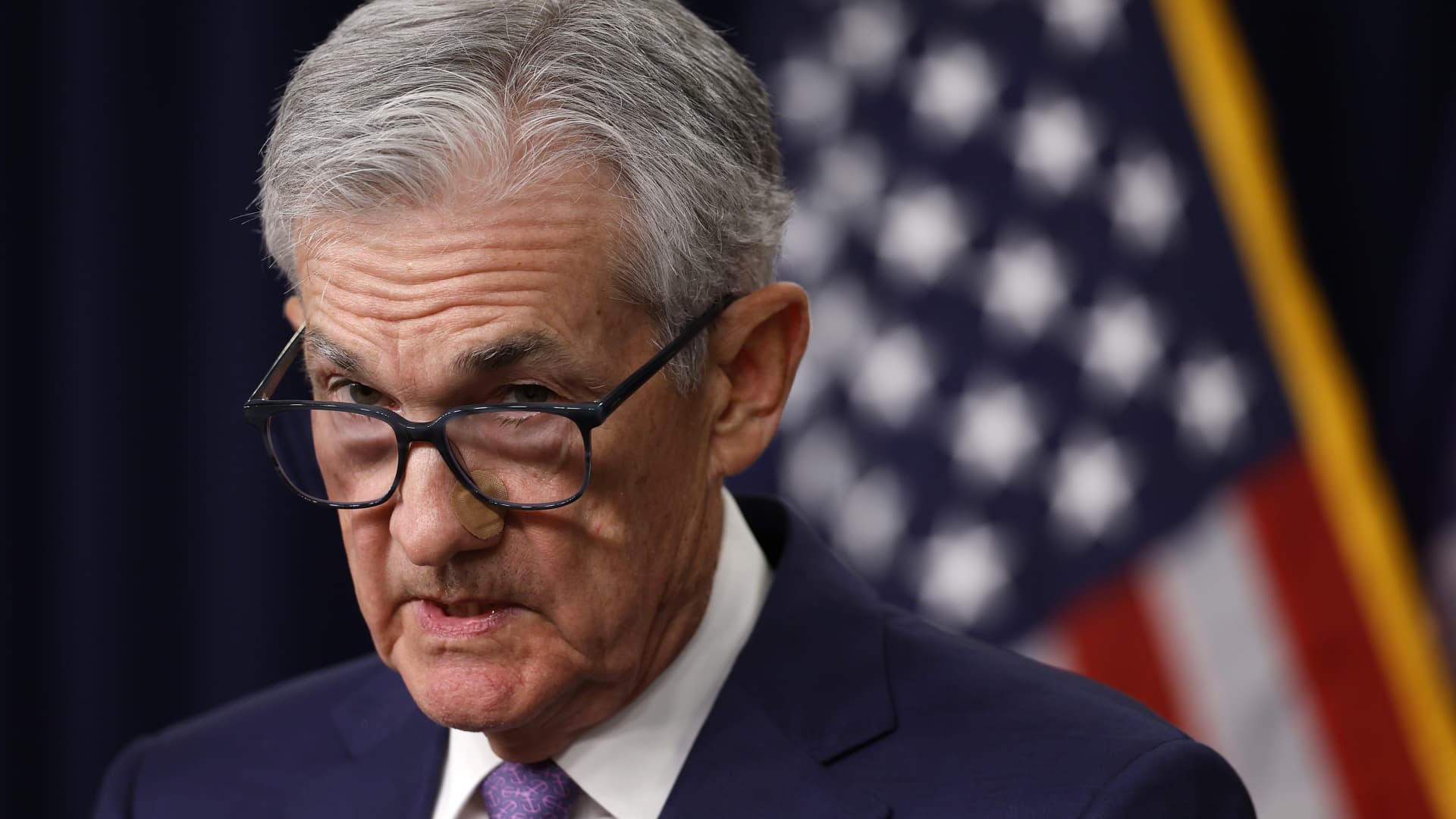Federal Reserve Chair Jerome Powell announces interest rates will remain unchanged during a news conference at the Federal Reserves’ William McChesney Martin Building in Washington, D.C., on June 12, 2024.
Kevin Dietsch | Getty Images
A flurry of major central banks will hold monetary policy meetings this week, with investors bracing for interest rate moves in either direction.
The Federal Reserve’s highly anticipated two-day meeting, which gets underway on Tuesday, is poised to take center stage.
The U.S. central bank is widely expected to join others around the world in starting its own rate-cutting cycle. The only remaining question appears to be by how much the Fed will reduce rates.
Traders currently see a quarter-point cut as the most likely outcome, although as many as 41% anticipate a half-point move, according to the CME’s FedWatch Tool.
Elsewhere, Brazil’s central bank is scheduled to hold its next policy meeting across Tuesday and Wednesday. The Bank of England, Norway’s Norges Bank and South Africa’s Reserve Bank will all follow on Thursday.
A busy week of central bank meetings will be rounded off when the Bank of Japan delivers its latest rate decision at the conclusion of its two-day meeting on Friday.


“We’re entering a cutting phase,” John Bilton, global head of multi-asset strategy at J.P. Morgan Asset Management, told CNBC’s “Squawk Box Europe” on Thursday.
Speaking ahead of the European Central Bank’s most recent quarter-point rate cut, Bilton said the Fed was also set to cut interest rates by 25 basis points this week, with the Bank of England “likely getting in on the party” after the U.K. economy stagnated for a second consecutive month in July.
“We have all the ingredients for the beginning of a fairly extended cutting cycle but one that is probably not associated with a recession — and that’s an unusual set-up,” Bilton told CNBC’s “Squawk Box Europe.”
“It means that we get a lot of volatility to my mind in terms of price discovery around those who believe that actually the Fed [is] late, the ECB [is] late, this is a recession and those, like me, that believe that we don’t have the imbalances in the economy, and this will actually spur further upside.”
Fed decision
Policymakers at the Fed have laid the groundwork for interest rate cuts in recent weeks. Currently, the Fed’s target rate is sitting at 5.25% to 5.5%.
Some economists have argued the Fed should deliver a 50 basis point rate cut in September, accusing the central bank of having previously gone “too far, too fast” with monetary policy tightening.
Others have described such a move as one that would be “very dangerous” for markets, pushing instead for the central bank to deliver a 25 basis point rate cut.


“We are more likely 25 but [would] love to see 50,” David Volpe, deputy chief investment officer at Emerald Asset Management, told CNBC’s “Squawk Box Europe” on Friday.
“And the reason you do 50 next week would be as more or less a safety mechanism. You have seven weeks between next week and … the November meeting, and a lot can happen negatively,” Volpe said.
“So, it would be more of a method of trying to get in front of things. The Fed is caught on their heels a little bit, so we think that it would be good if they got in front of it, did the 50 now, and then made a decision in terms of November and December. Maybe they do 25 at that point in time,” he added.
Brazil and UK
For Brazil’s central bank, which has cut interest rates several times since July last year, stronger-than-anticipated second-quarter economic data is seen as likely to lead to an interest rate hike in September.
“We expect Banco Central to hike the Selic rate by 25bps next week (to 10.75%) and bring it to 11.50% by end-2024,” Wilson Ferrarezi, an economist at TS Lombard, said in a research note published on Sept. 11.
“Further rate hikes into 2025 cannot be ruled out and will depend on the strength of domestic activity in Q4/24,” he added.
Traffic outside the Central Bank of Brazil headquarters in Brasilia, Brazil, on Monday, June 17, 2024.
Bloomberg | Bloomberg | Getty Images
In the U.K., an interest rate cut from the Bank of England (BOE) on Thursday is thought to be unlikely. A Reuters poll, published Friday, found that all 65 economists surveyed expected the BOE to hold rates steady at 5%.
The central bank delivered its first interest rate cut in more than four years at the start of August.
“We have quarterly cuts from here. We don’t think they are going to move next week, with a 7-2 vote,” Ruben Segura Cayuela, head of European economics at the Bank of America, told CNBC’s “Squawk Box Europe” on Friday.
He added that the next BOE rate cut is likely to take place in November.
South Africa, Norway and Japan
South Africa’s Reserve Bank is expected to cut interest rates on Thursday, according to economists surveyed by Reuters. The move would mark the first time it has done so since the central bank’s response to the coronavirus pandemic four years ago.
The Norges Bank is poised to hold its next meeting on Thursday. The Norwegian central bank kept its interest rate unchanged at a 16-year high of 4.5% in mid-August and said at the time that the policy rate “will likely be kept at that level for some time ahead.”
The Bank of Japan, meanwhile, is not expected to raise interest rates at the end of the week, although a majority of economists polled by Reuters expect an increase by year-end.















